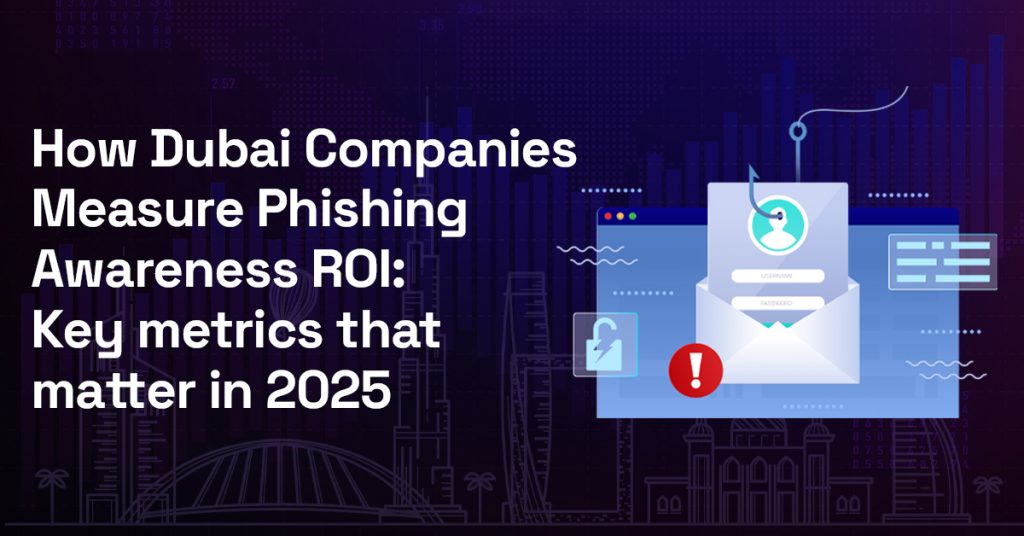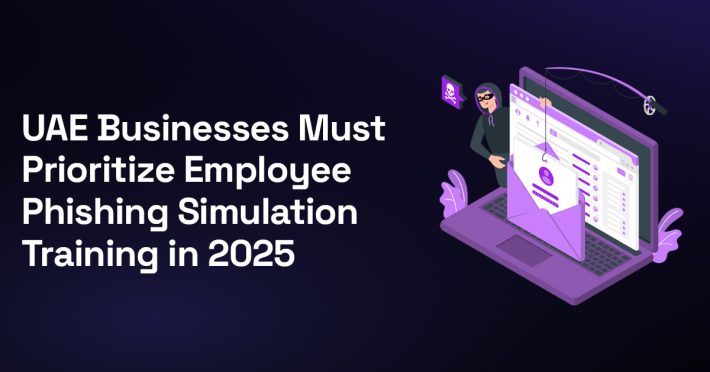How Dubai Companies Measure Phishing Awareness ROI: Key Metrics Matter in 2025

As cyber threats escalate globally and Dubai positions itself as a leading smart city, organizations are increasingly investing in phishing awareness programs to protect their digital assets. However, measuring the return on investment (ROI) of these initiatives remains a critical challenge for business leaders seeking to justify cybersecurity spending. With phishing breaches costing an estimated $4.88 million per incident, according to IBM, Dubai companies are turning to sophisticated measurement frameworks that demonstrate tangible value from their phishing campaign initiatives.
Modern organizations require concrete evidence that their cybersecurity investments deliver measurable business value. This comprehensive guide explores the key metrics, cost-saving strategies, and measurement methodologies that successful Dubai companies use to quantify their phishing awareness training effectiveness and demonstrate substantial ROI to stakeholders.
Understanding Phishing Costs vs. Training Investment – Phishing Awareness
The True Cost of Phishing Attacks
The financial implications of successful phishing attacks extend far beyond immediate incident response costs. Phishing awareness training yields a 50x ROI; for every $1 spent, companies save $50, making it one of the most cost-effective cybersecurity investments available to organizations. This remarkable return stems from the prevention of incidents that would otherwise result in substantial financial losses.
Current industry data reveals alarming cost projections that underscore the urgency of proactive training investments. Cybersecurity Ventures estimates cybercrime costs at $10.5 trillion by 2025, while another forecast mentions the cost of cybercrime at $23 trillion by 2027. These staggering figures highlight the critical importance of preventive measures, particularly phishing simulation campaign UAE programs that address the human element of cybersecurity.
The disparity between trained and untrained workforces reveals significant cost implications for Dubai organizations. Organizations with severe staffing shortages experience an average increase of $1.76 million in breach costs, according to IBM’s 2024 report, highlighting the importance of well-trained security teams.
Quantifying Training Effectiveness
Dubai companies implementing regular simulated phishing emails Dubai programs observe remarkable improvements in their security posture. Businesses that run regular phishing simulations see a huge drop in successful attacks. This dramatic reduction in successful attacks translates directly to cost avoidance and improved business continuity.
Statistical evidence from comprehensive training programs demonstrates the effectiveness of systematic approaches. 84% of US-based organizations have stated that conducting regular security awareness training has helped reduce the rate at which employees fall prey to phishing attacks, providing a benchmark for Dubai organizations seeking to measure their program effectiveness.
ROI Calculation Methodologies
Successful Dubai organizations employ structured approaches to ROI measurement that encompass multiple cost categories and benefit streams. The fundamental ROI calculation involves comparing the total cost of training programs against the financial benefits derived from incident prevention, compliance achievements, and productivity improvements.
Key cost components for running Phishing Awareness campaigns UAE initiatives include:
- Platform licensing and subscription fees
- Internal resource allocation for program management
- Employee time investment in training activities
- Content development and customization expenses
- Ongoing maintenance and program optimization costs
Corresponding benefit categories that contribute to positive ROI include:
- Prevented breach costs and associated downtime
- Regulatory compliance cost avoidance
- Reduced incident response and recovery expenses
- Enhanced productivity through improved security awareness
- Lower insurance premiums and risk assessment improvements
Advanced Metrics: Beyond Basic Click Rates
Behavioral Change Indicators
Modern phishing simulation best practices Dubai organizations recognize that simple click rates provide insufficient insight into actual security improvement. Phishing simulations reduce real phishing email clicks by a significant number, but comprehensive measurement requires examining multiple behavioral indicators that demonstrate lasting security awareness improvements.
Advanced analytics platforms enable Dubai companies to track sophisticated metrics that reveal deeper insights into employee behavior and learning patterns. Statistics show that trained users are 30% less likely to click on a phishing link, but organizations require more granular data to optimize their training strategies and demonstrate comprehensive program effectiveness.
Effective measurement frameworks incorporate reporting behavior as a critical success indicator. The average reporting rate of phishing simulations among customers was 13%, with this rate improving every year as more organizations implement phishing reporting add-ins. Dubai companies leveraging advanced reporting mechanisms observe significantly higher reporting rates, indicating improved security awareness and engagement.
Comprehensive Performance Analytics
Leading Dubai organizations implement multifaceted analytics approaches that capture various dimensions of training effectiveness. Key performance indicators extend beyond traditional metrics to encompass behavioral change, knowledge retention, and practical application of security principles in real-world scenarios.
Essential metrics for a comprehensive Phishing Awareness program evaluation include:
- Initial click rates and subsequent improvement trajectories
- Reporting rates and time-to-report improvements
- Repeat offender reduction and personalized intervention effectiveness
- Knowledge retention scores from follow-up assessments
- Real-world threat detection and response improvements
Frequency and Timing Optimization For Phishing Awareness
Industry best practices for simulation frequency continue to evolve based on empirical evidence from successful Phishing Awareness programs. In 2025, the industry best practice is to run simulations quarterly or bi-monthly, with ad-hoc testing during high-risk periods such as tax season, holidays, or organizational changes. Frequent, short, and varied simulations prove more effective than single large annual exercises.
Dubai companies implementing optimized scheduling observe enhanced engagement and improved learning outcomes. This approach enables organizations to maintain consistent security awareness while adapting to seasonal threat variations and organizational changes that may impact employee vulnerability levels.
Long-term Business Value and Competitive Advantage
Strategic Security Positioning for Phishing Awareness
Organizations that excel in phishing awareness training gain significant competitive advantages beyond immediate cost savings. Organizations with regular phishing training see 46 times fewer malware incidents, creating substantial operational advantages and enhanced business continuity that translate to market positioning benefits.
simUphish offers Dubai companies to achieve comprehensive security awareness transformation through integrated training approaches that address multiple threat vectors simultaneously. This holistic approach ensures that organizations develop robust security cultures rather than merely addressing isolated threat categories.
Compliance and Regulatory Benefits of Phishing Awareness
Dubai’s evolving regulatory landscape requires organizations to demonstrate proactive cybersecurity measures and continuous improvement in security awareness capabilities. Comprehensive training programs provide documented evidence of due diligence and regulatory compliance that supports audit requirements and regulatory interactions.
The integration of advanced analytics and reporting capabilities enables organizations to maintain detailed records of training effectiveness, employee participation, and security improvement trends. This documentation proves invaluable during regulatory assessments and demonstrates organizational commitment to cybersecurity excellence.
Cultural Transformation and Employee Engagement
Successful phishing awareness programs create lasting cultural changes that extend beyond specific threat mitigation. Employees who participate in well-designed training programs develop enhanced critical thinking skills and proactive security mindsets that benefit organizations across multiple operational areas.
The combination of immediate feedback, positive reinforcement, and practical learning experiences creates engaged employees who become active participants in organizational security rather than passive recipients of security policies. This cultural transformation represents a significant long-term value that extends far beyond measurable cost savings.
Conclusion
Dubai companies implementing comprehensive phishing awareness programs achieve remarkable returns on their cybersecurity investments, with industry data demonstrating 50x ROI potential and 90% reduction in successful attacks. The key to maximizing these returns lies in adopting sophisticated measurement methodologies that extend beyond basic click rates to encompass behavioral change, cultural transformation, and strategic business value.
Organizations that embrace phishing simulation best practices Dubai standards, while leveraging advanced analytics and continuous improvement frameworks, position themselves for sustained competitive advantage in an increasingly complex threat environment. As cybercrime costs continue escalating toward $10.5 trillion annually by 2025, proactive investment in employee training represents both a critical security necessity and a strategic business opportunity.
The evidence overwhelmingly supports comprehensive phishing awareness training as one of the most cost-effective cybersecurity investments available to modern organizations. Dubai companies that implement these programs with proper measurement frameworks will continue to demonstrate substantial value while building resilient security cultures that protect their stakeholders and support long-term business success in the digital economy.




